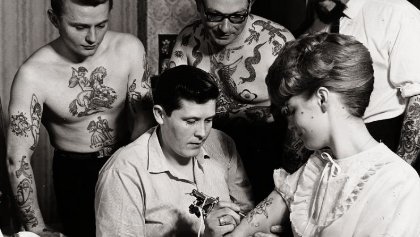Tattoos have their own unique power and magic. They not only beautify the body but also the psyche.


Tattooing is an ancient art form that has undergone a remarkable evolution over thousands of years, transforming from simple markings of cultural significance to intricate masterpieces of contemporary artistry. The journey of tattoo artistry is a testament to human creativity, innovation, and the enduring power of self-expression.
The origins of tattooing can be traced back to ancient civilizations around the world, where tattoos served as symbols of status, spirituality, and belonging. From the elaborate designs of the ancient Egyptians to the sacred markings of indigenous tribes, tattoos were imbued with deep cultural meaning and ritual significance.
As societies evolved and cultures intermingled, tattooing spread across continents, influencing and being influenced by diverse artistic traditions. In the Polynesian islands, intricate tattoo patterns known as "tatau" became symbols of identity and heritage, while in Japan, the art of "irezumi" evolved into a revered form of artistic expression.
In the Western world, tattooing underwent a renaissance in the 20th century, evolving from its association with counterculture and rebellion to a mainstream form of self-expression and adornment. The rise of tattoo artists as skilled practitioners and innovators in their own right led to the development of new techniques, styles, and aesthetic trends.
Today, tattoo artistry encompasses a vast and diverse landscape, with artists pushing the boundaries of creativity and technical skill in pursuit of ever more intricate and breathtaking designs. From hyper-realistic portraits to abstract compositions, tattoo artists draw inspiration from a myriad of sources, including fine art, pop culture, and personal narratives.
Advancements in technology have also played a significant role in the evolution of tattoo artistry, with innovations such as tattoo machines, ink formulations, and sterilization techniques contributing to the safety, precision, and longevity of tattoos. As a result, tattoos have become increasingly intricate, vibrant, and long-lasting, allowing artists to achieve levels of detail and realism once thought impossible.
Moreover, the growing acceptance and appreciation of tattoos as legitimate forms of art have elevated tattooing to new heights of cultural relevance and significance. Today, tattoos adorn the bodies of people from all walks of life, serving as personal statements of identity, creativity, and individuality.
In conclusion, the evolution of tattoo artistry is a testament to the enduring power of human creativity and self-expression. From ancient traditions to modern masterpieces, tattooing continues to captivate and inspire, reflecting the rich tapestry of human experience and the boundless depths of artistic imagination.